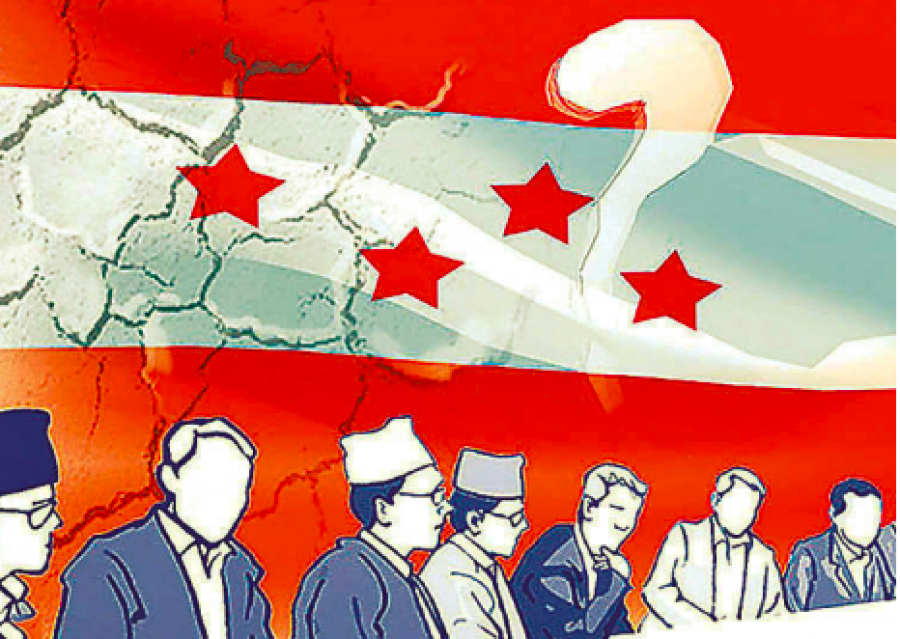Columns
Nepali Congress and the dynastic conundrum
Pursuit of fulfilling self-interest usually results in moral corruption, abuse of authority and misgovernance.
Sambridh Ghimire
As the 14th convention of the Nepali Congress nears its finale, the roads have been filled with whispers. Some whispers are rewarding, while others are just like the old game of Chinese whispers. But alongside all this clamour, the real question seems to have attenuated the type of leadership that the party desires and needs. On its face, the contest appears to be more focused on the person rather than their policies. People are judged based on their caste, creed, clan, colour, and cuisine rather than their vision and capability. All through the party body, candidates have been contesting elections based on factions, conveniently naming them as 'panels'. Although all these infirmities seem new to the grand old party, what remains as an everlasting vestige is the presence of dynasties in the party.
Borrowing a theory from our northern neighbour, the dynastic cycle is a fundamental political theory in Chinese history. According to this, each dynasty rises to a political, cultural, and economic peak. Then, they decline, lose the 'Mandate of Heaven', and fall because of moral corruption, only to be replaced by a new dynasty. The cycle then repeats under a surface pattern of repetitive motifs. This theory applies to Nepal in the case of Ranas and the Shahs in the undemocratic era, and if it were to apply in today's Nepal, it would apply to the Koiralas.
Belonging to a political family has its charms and perils. It provides a platform for political socialisation and a free immersion into strategic political affairs, usually from a very young age. In cases where their relatives have held political office for an extended period, this power often becomes self-perpetuating, as individuals continually seek to find a successor to inherit their political investments and reap the dividends or carry on their legacy after their departure. An individual belonging to such a family can capitalise on the family brand, trust from constituents, access to funds and coverage from media, and a good buy-in in the organisation and well-established network of cadre. Martin Ljunge claims that across 83 nations, strong family ties are observed to be related to civic virtues like honesty towards the state.
On the other hand, over generations, individuals start taking these advantages as an inheritance. As a result, they often disregard the public interest to fulfil their personal or kinship needs. This pursuit of fulfilling self-interest usually results in moral corruption, abuse of authority and misgovernance.
In his essay Like Father, Like Son? SE George observes that the opportunity to found a political dynasty might thus have positive development consequences, especially if regular politicians generally have shorter time horizons than voters. This is called the founder effect. This can be applied to the case of the Nepali Congress, where the founder's effect was seen during the early years of the party. The founder's effect in the Congress continued till the 1990s where the party was able to secure two victories in three elections.
On the other hand, dynastic heirs often inherit political capital from their predecessors—a prominent name, a positive reputation, a robust network, a party machine. If these political assets give dynastic descendants a significant electoral advantage, elections may be less effective at holding them to account. Descendants could be poorly selected (if electoral advantages allow even "lemon dynasts" to win) or face poor incentives (if their re-election does not depend on performing well in office). These descendant effects are likely inadequate for development. This effect is what has started ailing the party since the 2000s. The net impact of the dynastic rule is a combination of founder and descendant effects.
For any dynasty to overcome these challenges, there is a need for a critical juncture, i.e. an event that threatens the institution's fundamental tenets that they are a part of. The crucial juncture for the Koiralas was the 13th convention of the Nepali Congress and how the party's affairs have been conducted ever since. A dynasty that realises this and transforms itself with the changing needs of time can survive till eternity. Otherwise, it withers away with the sands of time, like in the case of Bhuttos in Pakistan, the Gandhis in India or the Razaks of Malaysia.
The present case in the Congress is peculiar; there is a new dynasty trying to establish itself. Others are resisting the very foundation of this dynasty. Then there are members of an old dynasty trying to assert their presence, be it ideological or material. All in all, it is more of a battle between dynasties than a party election. At the same time, I believe that the hereditary transfer of power would be antithetical to the very foundation of democracy. When one looks and gazes at the aspirants for the president of Congress, five have some ties to one or another political family. After all, democracy is not always about choosing the ideal candidate. Still, sometimes it is about selecting the most suitable candidate from the available pool for the system's survival, ethos and values, with familial ties not being a deterrent.
It is always welcome to have fierce cross-cutting competition in democratic parties. But sometimes, personal interests could dilute the fundamental ideals and principles for which dynasties, groups and people have stood. This convention, this ailment has impeded Congress too. Unfortunately, individuals have preferred their interest over their ancestors' ideology and ideas, desire power over party-centric policies, and have a fetish towards monetary gains over cadre.
I believe that a day will come when leaders are chosen over their merit rather than decent. But until then, we must make do with the best descendent that we have among us. After all, most of us would prefer being ruled by a dynast than being governed by an incompetent fool.




 13.12°C Kathmandu
13.12°C Kathmandu















